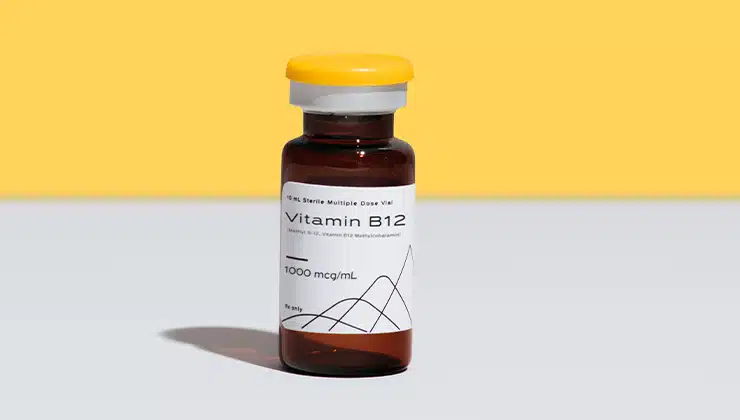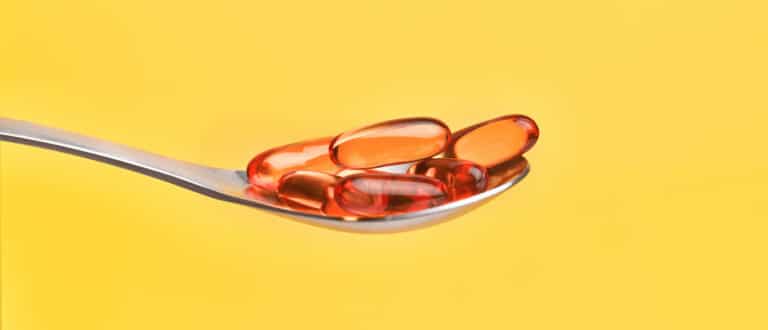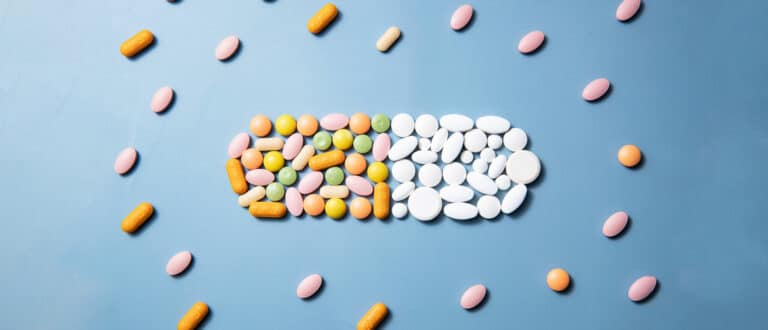4 Benefits of B12 Shots
Fast Facts
- B12 is a nutrient needed to form red blood cells, DNA, and brain and nerve cells.
- In deficient people, the benefits of B12 shots include improved mood and increased energy levels.
- If a doctor prescribes B12 injections, symptoms like fatigue, weakness, depression, and more may resolve within generally resolve in six to 12 weeks.
B12 has become something of an “it supplement” lately, with celebrities getting B12 shots after pulling all-nighters and athletes using them to enhance recovery. But in terms of the science, what are the benefits of vitamin B12 injections?
“It’s a question many people are asking, given the fact that B12 is so dramatically effective in individuals who are truly B12 deficient,” says Ralph Green, M.D., Ph.D., FRC Path, a distinguished professor and emeritus chair in the department of pathology and laboratory medicine at U.C. Davis, who has studied B12 for over 50 years.
A study in the journal Mayo Clinic Proceedings (1) sheds light on some of the potential benefits of B12 injections for people with a deficiency. Researchers shared that one 55-year-old woman who struggled with depression and symptoms such as numbness in her feet saw her symptoms gradually lessen within three to four weeks of getting B12 shots. A 17-year-old saw symptoms such as fatigue, dizziness, and nausea she’d battled for two years either reduce considerably—some even vanished. A 62-year-old woman who struggled with tiredness and trouble concentrating after gastric bypass surgery saw her symptoms resolve almost entirely within two months after starting B12 shots.
“Patients have described it as ‘I’ve been born again,’” says Green. Perhaps, as a result, these quick boosts of B12 have been touted as everything from a weight-loss tool to an energy booster to a workout recovery aid. But if you’ve been feeling run down, can B12 shots help you? Here’s what experts say.
What Is B12?
Also known as cobalamin, B12 is a micronutrient your body needs to form DNA (2) and red blood cells. It’s also important for the formation of brain and nerve cells, according to Harvard University experts.
How Can You Take B12?
Since our bodies don’t make B12, you have to consume it through food. Animal products like meat, eggs, fish, and dairy contain B12; so do some fortified foods, like certain cereals. But you can also dose up through shots or supplements.
B12 at a Glance
- B12 is a vitamin your body needs to produce red blood cells and DNA. It’s also important for the formation of brain and nerve cells.
- Your body can’t make B12 so you need to get it from food or supplements.
- You can get B12 from food or supplements.
How Do Vitamin B12 Shots Work?
B12 can be injected into muscle, usually the arm or buttocks. “The injections sit in the muscle tissue as kind of a reservoir and slowly leak out over time into the blood,” explains Joshua Miller, Ph.D., a B12 researcher, and professor and chair in the department of nutritional sciences at the school of environmental and biological Sciences at Rutgers University.
Another upshot? After an initial round of closely spaced injections, patients can often go for a shot just once a month, instead of taking a daily supplement. Although B12 injections require a prescription, they’re now widely available at CVS MinuteClinics. Some patients also opt to self-administer the shots at home.
How Do B12 Shots Differ From Supplements?
There are lots of over-the-counter forms of B12 to choose from, including pills, lozenges, and sublingual tablets. There’s also a prescription B12 nasal spray.
If you opt for oral supplements, your body absorbs the B12 in your G.I. tract—similar to how it’s processed when food is your source. This uptake depends on a protein called intrinsic factor (IF), which captures B12 in the small intestine, absorbing it in the final stretch of your small intestine (the ileum).
If you have a healthy digestive system, you’ll very efficiently absorb the first two micrograms of an oral dose (about 70 to 90 percent of it), says Green; after that, you’ll take in a small additional amount as it diffuses across the mucus membranes of your G.I. tract. However, if you lack IF (the case for people with pernicious anemia; see below), your small intestine can’t absorb supplemental or dietary B12, so you’ll only glean a small fraction (about 1 to 2 percent) of the dose.
With sublingual or intranasal B12, the vitamin seeps through the linings of your mouth, nose, or G.I. tract. That means you’ll only capture 1 to 2 percent of the dose (as mentioned above), making this an inefficient way to increase your B12 levels.
B12 Shots vs Supplements
- B12 can be injected into the muscle (usually the arm or buttock). The nutrient is slowly released into the blood.
- B12 injections need to be taken less frequently than oral supplements.
- Some B12 can be lost in your G.I. tract if you take oral supplements.
If you’re fatigued due to deficiency, B12 shots may help recharge your battery.
The Health Benefits of B12 Injections
Improved Mood
Evidence has linked depression with B12 deficiency. So if you’re short on the nutrient, the shots may help normalize your mood. Of course, if you’re depressed, Miller emphasizes, you shouldn’t self-medicate with any supplement, B12 included. Make seeing your healthcare professional a priority, and while you work toward a diagnosis, you can ask your provider to prescribe B12 injections.
Keep in mind: You may not see improvement if B12 deficiency isn’t the underlying cause of your depression. In a study (3) of people with normal levels of the vitamin, a B12 supplement didn’t have an effect on depression.
Bone Health
If your body lacks B12, your skeleton may suffer: in a study published in the Journal of Bone and Mineral Research (4), low B12 was linked with poor bone mineral density, suggesting a role for the vitamin in bone formation. Older folks who are deficient may also be at higher risk of osteoporosis and hip fractures (a known complication of pernicious anemia). However, as Miller says, the research linking B12 with bone health only shows an association, not a cause-effect relationship.
Increased Energy
If you’re fatigued due to deficiency, B12 shots may help recharge your battery. Fatigue may be a problem for those in particular with pernicious anemia, a cause of low B12. Pernicious anemia develops when your body cannot make enough healthy red blood cells because it doesn’t have enough vitamin B12. This can lead to low energy levels. See below for more on whether non-deficient folks should consider B12 shots to improve their energy.
Related: Always Tired? Here Are 5 Reasons Why
Memory Maintenance
Don’t forget your B12. “Normal B12 status is important in the preservation of normal cognitive function,” says Green. In fact, people with vitamin B12 levels on the lower side of normal performed worse on memory tests than those with high-normal levels in a study in The American Journal of Clinical Nutrition (5). Even after age differences were accounted for, the effect on memory remained. Why? Inadequate B12 has been associated with degeneration of neurons and atrophy of your brain’s gray matter, which is critical for information processing.
Memory loss is one symptom you don’t want to neglect: “The neurologic complications of B12 deficiency are often reversible, but not always,” warns Green.
B12 Benefits
- If you are deficient, B12 injections may improve mood, strengthen your skeleton, boost energy levels, and improve memory.
- You can’t take too much B12; your body will flush out what you can’t use.
- Common side effects of B12 injections include diarrhea, headache, and swelling.
Vitamin B12, now available from Hone, may boost your energy, reduce stress, and support your brain. Connect with a doctor to see if it’s right for you.
Who Should Get B12 Injections?
People who will get the biggest benefits of B12 injections fall into these categories:
People with B12 deficiency due to malabsorption
Vitamin B12 deficiency is notoriously tough to diagnose—the blood tests are prone to both false positives and false negatives (7)—and doctors don’t always agree on which combination of tests to use. Yet, B12 deficiency is clearly a problem: In the United States, it is estimated that roughly 6 percent of people under age 60 (8) are short on the micronutrient. That number rises to 1 in 5 in the over-60 population. There are also lots of people who land in the gray area, where they’re not clinically deficient, but don’t have adequate levels, either.
One of the most common culprits behind B12 deficiency is malabsorption, where a step in the breakdown and absorption of B12 goes awry, preventing your system from soaking it up. In these cases, even the largest oral dose won’t significantly spike your levels, since your body is unable to utilize the vitamin. That makes injections your best bet if you’re dealing with…
1. Pernicious anemia
With pernicious anemia—a frequent cause of B12 deficiency—autoimmune activity destroys the intrinsic factor protein or the cells that make IF, which means the ileum of affected folks can’t absorb the vitamin. “You want to be sure the B12 gets into the body,” says Green. “The surefire way of doing that is by injecting into the muscle.”
2. Atrophic gastritis
Loss of stomach acid, usually seen in older adults, can result in a condition called atrophic gastritis, says Miller. With reduced stomach acid to break down your food, you may not be able to access the B12 embedded in your burger.
3. Bariatric surgery
Restricted stomach = reduced B12. “When you bypass the stomach or put a band around the stomach, or any of these various surgical procedures to reduce weight, you diminish the capacity to absorb B12,” says Green. Or as Miller puts it, “You’ve essentially made the person equivalent of having pernicious anemia.” That’s because these surgeries can reduce the production of both intrinsic factor and stomach acid, which is necessary for digesting food. These patients may only need a handful of injections to restore their B12 levels, which can then be maintained with a high-dose supplement or scheduled injections.
4. Certain medications
Two classes of drugs—proton-pump inhibitors (e.g. Nexium and Prilosec) and H2 blockers (e.g. Zantac and Pepcid)—may interfere with B12 absorption after long-term use, since they lower the acidity of the stomach.
Another potential B-enemy: metformin (a medication taken by diabetics to control blood sugar levels). Studies have shown that long-term use of metformin may be associated with B12 deficiency.
Although taking these meds doesn’t automatically equal deficiency, your doctor should keep an eye on your B12 levels, especially if you’ve been taking acid-blockers for longer than a year or metformin for more than four months, according to an article in the journal, American Family Physician (9).
5. Autoimmune digestive diseases
Crohn’s disease can affect the absorption of B12, since the ileum is often affected, according to British researchers (10). Celiac disease can also lead to malabsorption because the intestinal villi, the finger-like protrusions that absorb nutrients, can begin to atrophy, Dutch scientists (1) say.
People who don’t eat enough B12-rich foods
Non-meat-eaters don’t have a problem absorbing B12—they just don’t consume enough of it. That means vegans and vegetarians may respond well to B12 supplements or injections.
Side Effects of B12 Injections
You don’t have to worry about overdoing it: There’s no established toxic dose for B12—since it’s a water-soluble vitamin, you’ll flush out whatever you can’t use. The main complaint is mild to moderate pain, particularly in thin people (6). “There might be some discomfort from the injection, not much different from getting a vaccination,” says Miller. “You are injecting a liquid that’s going to disperse into the muscle and sit there for a while, so there may be a little bit of soreness related to that.”
Other common side effects include diarrhea, headache, and swelling (and not only at the site of the injection). If you experience any uncommon side effects, such as chest pain or hives, contact your health care provider immediately.
Can I Get B12 Shots if I’m Not Deficient?
Non-deficient people report a lift in energy after taking B12 injections, but there’s not much scientific evidence that this actually works, says Miller.
What we do know: In one Dutch study when people with IBS or IBD and normal B12 levels were given a daily B12 supplement, they didn’t report any significant improvements in fatigue, depression, or quality of life. There was, however, a noticeable spike in “motivation” in the B12 group.
Similarly, Miller says he’s heard anecdotal reports of people feeling hyped-up after B12 injections. In a Swiss study (11), almost half of all general practitioners agreed with prescribing B12 for unexplained fatigue, even though there’s not much research to bear it out.
Essentially, there’s no strong evidence that B12 shots can harm you—but if you’re not deficient, there’s no guarantee they’ll help you, either. “If you want to [get them], and you feel better, then that’s okay,” Miller says. Green chalks these kinds of cases up to the placebo effect. Some non-deficient folks may subjectively feel more energetic or in a better mood after getting stuck, but the shots probably don’t confer any actual physiological benefit for them
- A B12 deficiency is difficult to diagnose; blood tests are prone to false positives and false negatives.
- People with malabsorption are more likely to have B12 deficiency. So are those who take certain medications including proton-pump inhibitors.
- B12 is often found in animal-based foods, so vegetarians and vegans may also be at risk.
How Do I Know If I’m B12 Deficient?
What makes B12 deficiency tricky is that it can fly under the radar, sometimes causing no symptoms at all, if it’s a mild deficiency. And when there are symptoms—things like fatigue, tingling hands, and feet, dizziness, and memory loss—they’re often so non-specific that doctors won’t always flag B12 deficiency as an obvious cause. Add to that the lack of a gold-standard test for deficiency, and you can see why it’s an easy issue to miss.
So who should request a test? Anyone over 60 should have their M.D. monitor their levels, says Miller, since pernicious anemia is especially prevalent in the elderly.
No matter your age, if you’re vegan, vegetarian, or dealing with any of the common medical causes of deficiency), it’d be wise to consider a B12 work-up. What that means isn’t always straightforward: In the Swiss study mentioned above, nearly three-quarters of primary-care docs surveyed reported using a multi-step approach (and not always the same one) when testing for B12 deficiency—a practice that Miller says improves the odds of an accurate diagnosis since serum B12 levels alone don’t always accurately identify a deficiency.
Your move? Ask your doctor for a total B12 test, as well as a screening for one or two of these compounds: holotranscobalamin, methylmalonic acid (MMA), and homocysteine. The latter two are often elevated with B12 deficiency (MMA is especially predictive) while emerging evidence suggests that holotranscobalamin better reflects your B12 status than serum levels, says Miller, since it measures how much of the nutrient is actually being delivered to the tissues of your body.
How Quickly Do B12 Shots Work?
If you have pernicious anemia, you may see improvement relatively quickly, says Miller, since it only takes three to four days after a shot for your body to begin producing red blood cells. According to a Clinician’s Guide in a University of Virginia report published in 2018, the condition may not fully resolve for up to eight weeks, however (8) Neurologic symptoms, like tingling, numbness in hands and feet, or dizziness, generally improve in six to 12 weeks, and severe neurological symptoms, like difficulty walking, may not ever resolve completely.
How Often Will I Need B12 Injections?
Although every patient’s condition has to be evaluated, generally, when treating a B12 deficiency, according to the University of Virginia report, it’s effective for your physician to start you with 1,000-microgram shots every day or two for the first week. After that, you may shift to once-a-week injections for one to two months, and then to the maintenance phase, where you receive monthly injections. If your condition is treatable but irreversible (like pernicious anemia), says Green, you’ll probably need to receive B12 shots or a large oral dose indefinitely.
The Bottom Line
In people who are deficient the benefits of B12 injections include improvements in mood, memory, and energy. The same has not been seen in people without a deficiency. The only way to know if you are deficient is to have your levels tested.
References:
1. Wolffenbuttel, Bruce H.R.et al (2019). The Many Faces of Cobalamin (Vitamin B12) Deficiency.
2. Bardheci, Katarina et al (2021). Testing and Prescribing Vitamin B12 in Swiss General Practice: A Survey among Physicians.
3. Wang H, et al (2018). Oral vitamin B12 versus intramuscular vitamin B12 for vitamin B12 deficiency.
4. Tucker, K.L. et al (2005), Low Plasma Vitamin B12 Is Associated With Lower BMD.
5. Theresa Köbe, et al (2016). Vitamin B-12 concentration, memory performance, and hippocampal structure in patients with mild cognitive impairment.
6. Wang H, et al (2018). Oral vitamin B12 versus intramuscular vitamin B12 for vitamin B12 deficiency.
7. Ward MG, et al (2015). Prevalence and Risk Factors for Functional Vitamin B12 Deficiency in Patients with Crohn’s Disease.
8. Wentworth, Brian et al (2018). Revisiting Vitamin B12 Deficiency: A Clinician’s Guide For the 21st Century.
9. Langan, Robert C, et al (2017). Vitamin B12 Deficiency: Recognition and Management
10. Ward MG, et al (2015). Prevalence and Risk Factors for Functional Vitamin B12 Deficiency in Patients with Crohn’s Disease.
11. Bardheci, Katarina et al (2021). Testing and Prescribing Vitamin B12 in Swiss General Practice: A Survey among Physicians.














